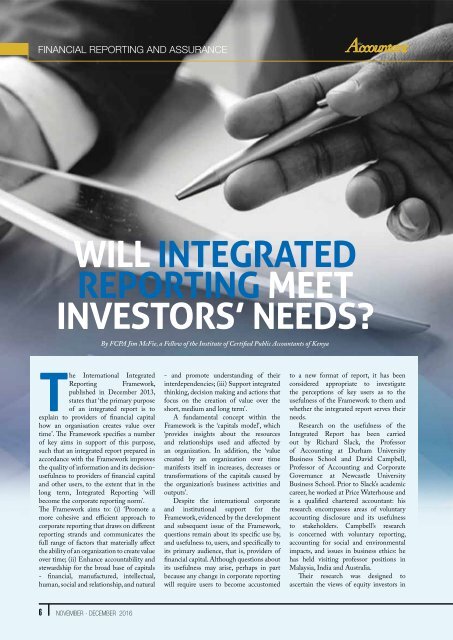The Accountant Nov-Dec 2016
Create successful ePaper yourself
Turn your PDF publications into a flip-book with our unique Google optimized e-Paper software.
Financial Reporting and Assurance<br />
WILL INTEGRATED<br />
REPORTING MEET<br />
INVESTORS’ NEEDS?<br />
By FCPA Jim McFie, a Fellow of the Institute of Certified Public <strong>Accountant</strong>s of Kenya<br />
<strong>The</strong> International Integrated<br />
Reporting Framework,<br />
published in <strong>Dec</strong>ember 2013,<br />
states that ‘the primary purpose<br />
of an integrated report is to<br />
explain to providers of financial capital<br />
how an organisation creates value over<br />
time’. <strong>The</strong> Framework specifies a number<br />
of key aims in support of this purpose,<br />
such that an integrated report prepared in<br />
accordance with the Framework improves<br />
the quality of information and its decisionusefulness<br />
to providers of financial capital<br />
and other users, to the extent that in the<br />
long term, Integrated Reporting ‘will<br />
become the corporate reporting norm’.<br />
<strong>The</strong> Framework aims to: (i) ‘Promote a<br />
more cohesive and efficient approach to<br />
corporate reporting that draws on different<br />
reporting strands and communicates the<br />
full range of factors that materially affect<br />
the ability of an organization to create value<br />
over time; (ii) Enhance accountability and<br />
stewardship for the broad base of capitals<br />
- financial, manufactured, intellectual,<br />
human, social and relationship, and natural<br />
- and promote understanding of their<br />
interdependencies; (iii) Support integrated<br />
thinking, decision making and actions that<br />
focus on the creation of value over the<br />
short, medium and long term’.<br />
A fundamental concept within the<br />
Framework is the ‘capitals model’, which<br />
‘provides insights about the resources<br />
and relationships used and affected by<br />
an organization. In addition, the ‘value<br />
created by an organization over time<br />
manifests itself in increases, decreases or<br />
transformations of the capitals caused by<br />
the organization’s business activities and<br />
outputs’.<br />
Despite the international corporate<br />
and institutional support for the<br />
Framework, evidenced by the development<br />
and subsequent issue of the Framework,<br />
questions remain about its specific use by,<br />
and usefulness to, users, and specifically to<br />
its primary audience, that is, providers of<br />
financial capital. Although questions about<br />
its usefulness may arise, perhaps in part<br />
because any change in corporate reporting<br />
will require users to become accustomed<br />
to a new format of report, it has been<br />
considered appropriate to investigate<br />
the perceptions of key users as to the<br />
usefulness of the Framework to them and<br />
whether the integrated report serves their<br />
needs.<br />
Research on the usefulness of the<br />
Integrated Report has been carried<br />
out by Richard Slack, the Professor<br />
of Accounting at Durham University<br />
Business School and David Campbell,<br />
Professor of Accounting and Corporate<br />
Governance at Newcastle University<br />
Business School. Prior to Slack’s academic<br />
career, he worked at Price Waterhouse and<br />
is a qualified chartered accountant: his<br />
research encompasses areas of voluntary<br />
accounting disclosure and its usefulness<br />
to stakeholders. Campbell’s research<br />
is concerned with voluntary reporting,<br />
accounting for social and environmental<br />
impacts, and issues in business ethics: he<br />
has held visiting professor positions in<br />
Malaysia, India and Australia.<br />
<strong>The</strong>ir research was designed to<br />
ascertain the views of equity investors in<br />
6 NOVEMBER - DECEMBER <strong>2016</strong>


















